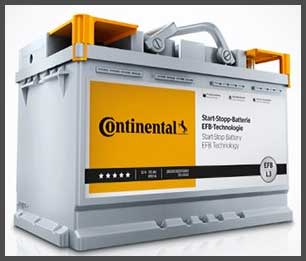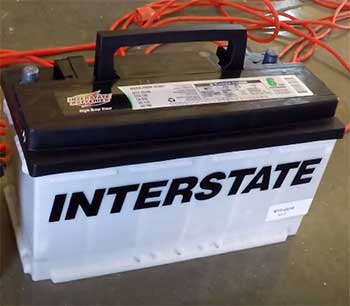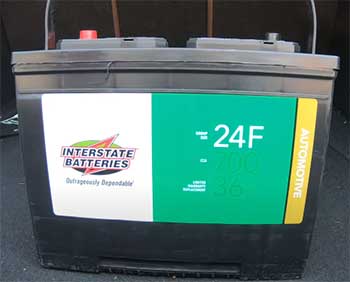If you’ve been shopping around for a new car battery, you’ve probably come across two major brands: Continental and Interstate. Both companies have been around for decades and make batteries for all types of vehicles.
But which one is better for your car or truck?
In this comprehensive guide, we’ll compare Continental and Interstate car batteries to help you decide which is the right choice.
A Brief Comparison Table
| Feature | Continental | Interstate |
| Battery Technology | Absorbed Glass Mat (AGM) | Traditional flooded lead-acid |
| OEM vs Aftermarket Focus | OEM supplier for new car models | Primary aftermarket/replacement brand |
| Battery Sizes/Configurations | More factory specfic fitments | Broader range of universal sizes |
| Pricing | 15-25% higher cost vs Interstate | Very competitively priced aftermarket option |
| Manufacturing | Emphasizes European standards | Highlights American-made designs |
| Lifespan | 400-800 cycles typically | 300-500 cycles usually |
| Cold Cranking Amps | Up to 800+ CCA available | Up to 800+ CCA on largest models |
| Reserve Capacity | 150 minutes or higher | 90-120 minutes typical |
| Charging Time | Very fast recharge rate | Slower recharge time |
| Maintenance Needs | Totally sealed and maintenance-free | May need occasional water top-up |
| Warranty | 1-3 years full coverage, not transferable | Pro-rated coverage, transferable between vehicles |
| Availability | More readily at dealerships | Widely sold at local auto parts stores |
Overview of Continental and Interstate Batteries
First, let’s start with a quick rundown of these two battery manufacturers.
Continental Batteries

Continental is a brand of auto parts and batteries that has been around since 1895. They make lead-acid batteries for passenger vehicles and trucks. Some key things to know:
- Based in Hamburg, Germany but batteries made globally
- OEM supplier to major automakers including Volkswagen and BMW
- Wide range of battery types and sizes for many makes and models
- Focus on quality and performance with high cycle life
- Brand owned by Clarios, one of the world’s largest battery manufacturers
Interstate Batteries
Interstate is one of the most popular aftermarket battery brands in the US. Some quick facts:
- Founded in 1952 and headquartered in Dallas, Texas
- Largest privately-held battery company in the US
- Top seller of replacement batteries for cars, trucks, powersports, commercial, marine
- Extensive product range with over 200 types of batteries
- Known for nationwide warranty program and retail distribution network
Now that we’ve introduced the two brands, let’s take a deeper look at how their car batteries compare.
Key Differences Between Continental and Interstate Car Batteries
While Continental and Interstate both make high quality batteries, there are some notable differences between their products when it comes to cars and trucks.
- Battery Technology
One of the biggest differences is battery technology. Continental uses Absorbed Glass Mat (AGM) technology in many of its car batteries. AGM batteries have the electrolyte suspended in fiberglass mats which makes them spillproof and allows them to be mounted in any position.
Interstate uses primarily traditional flooded lead-acid batteries with the electrolyte suspended in liquid.
AGM batteries have advantages like faster recharging, reduced corrosion, and ability to deliver more current. But they tend to be more expensive than traditional flooded batteries.
- OEM Vs Aftermarket Focus
As an OEM supplier to major automakers, Continental designs batteries specifically for new car models. Their batteries are tailored for optimal fit and performance in the vehicles they are designed for.
Interstate offers a wider range of “universal fit” options since they are primarily an aftermarket brand.
- Battery Sizes and Configurations

Given Continental’s OEM focus, they tend to offer more factory replacement options with exact fitments.
Interstate has a broader range of sizes and designs to fit many different aftermarket applications.
Interstate’s offering includes various terminal configurations and positions to accommodate installing the batteries in existing vehicles.
- Pricing and Warranties
Continental batteries can cost more than Interstate since they position themselves as a premium OEM brand.
Interstate aims to be very price competitive as a leader in the aftermarket space.
Interstate offers an extensive pro-rated warranty program through retail stores, while Continental has a more traditional limited factory warranty.
- Manufacturing and Materials
Both brands source components globally but Continental emphasizes European quality standards while Interstate highlights American-made designs. Continental uses ABS plastic for improved resistance to temperature changes and cracking.
Interstate often uses standard polypropylene plastic for battery cases. Active material composition can also vary between each manufacturer’s models.
Choosing The Right Battery – Continental Or Interstate
So when trying to decide between Continental and Interstate for your vehicle, there are a few key factors to consider:
- Vehicle Make and Model
Check if Continental offers an OEM-fit battery specifically designed for your car or truck. This will provide optimal performance and convenience. Interstate will be a good option if you can’t find a Continental battery made for your specific vehicle.
- Budget and Warranty Needs
The lower cost and comprehensive warranty of Interstate batteries make them a smart choice for many budgets. Paying more upfront for a Continental battery can be worth it for the OEM quality and longer lifespan.
- Battery Features
Think about which features are most valuable for how you use your vehicle – things like cold cranking amps for frequent cold weather starting, longer reserve capacity for heavy electrical loads, deep cycle capability for accessory use, or calcium alloy grids for prolonged life. Compare what each brand offers for your needs.
- Where You’ll Purchase and Install
Interstate batteries are widely available at local retailers where you can often get free installation. Continental batteries may be more conveniently purchased from dealerships and auto shops with factory trained technicians.
- Vehicle Age and Battery Access
If you have an older car where access is tight, the easy fit and flexibility of Interstate’s range of sizes can be key during installation. For newer cars, factory fit Continental OEM batteries simplify the process.
By weighing these factors specific to your vehicle and needs, you can zero in on the right battery choice between these two top brands.
Also Read: Comparison of DieHard And Duracell Car Batteries.
In-Depth Comparison of Key Features
To give you more insight for making your decision, here’s a detailed overview of how Continental and Interstate compare on some of the most important battery performance features:
- Lifespan and Durability

The lifespan of a car battery is one of the most critical considerations since longer life means less frequent replacement.
Both Continental and Interstate build their batteries to last 3-5 years on average.
However, Continental emphasizes high cycle life with batteries rated for 400-800 cycles depending on the model.
Interstate batteries are typically rated for around 300-500 cycles under normal conditions.
The premium AGM technology used by Continental also enhances stability for greater durability over time.
- Cold Cranking Amps
Cranking power for starting in cold weather is measured in cold cranking amps (CCA). Most Continental and Interstate batteries meet or exceed the OEM CCA recommendations for the vehicles they are designed to fit.
Larger and higher end models from both brands can provide 800+ CCA for extreme conditions. Overall Continental tends to have a slight edge in maximum CCA ratings for short high power bursts.
- Reserve Capacity
This measures how long a battery can continue to provide power if the alternator fails. It’s a good indicator of battery performance under high electrical loads.
Continental’s AGM batteries capable of deep cycling tend to have very high reserve capacities of 150 minutes or more. Typical Interstate flooded batteries offer decent reserves of around 90-120 minutes.
- Charging and Maintenance
AGM technology allows Continental batteries to recharge must faster. Their low internal resistance also provides more stable voltage. Interstate’s flooded lead-acid models require longer charging and have higher discharge rates when heavily used.
In terms of maintenance, the sealed AGM Continental batteries never need checking or adding fluid. Interstate’s conventional designs may require occasional water top-ups to maintain levels.
- Warranties
Interstate provides an excellent pro-rated warranty that remains valid if you move the battery to another eligible vehicle. You can get a replacement credit based on the remaining warranty period if it fails.
Continental batteries have more limited full warranty terms from 1-3 years depending on the model. Their warranties are not transferrable between vehicles.
- Price
Across all types of vehicles, Continental batteries retail at 15-25% higher prices than comparable Interstate models. This pricing difference reflects the premium OEM quality and technology Continental provides. Interstate seeks to be very competitively priced within the aftermarket category.
Their same batteries are often less expensive at local retailers than at auto dealerships.
As you can see, Continental batteries tend to lead in quality and performance metrics. But Interstate still produces a very reliable product at a more accessible price point for consumers.
Also Read: Comparison of Interstate And DieHard Car Batteries.
Frequently Asked Questions (FAQ)
Based on reputation and owner satisfaction surveys, some of the most reliable car battery brands are Optima, Odyssey, Bosch, Continental, and Interstate. Of these, Continental and Interstate stand out for making affordable, dependable batteries to fit most vehicles.
Interstate is one of the leading and most trusted aftermarket battery brands. Their widespread availability, competitive pricing, and excellent warranty program make them a top choice for many drivers. They produce excellent quality batteries for a broad range of vehicles.
Some of the other major brands that produce batteries comparable in quality and performance to Interstate include Duralast, DieHard, Kirkland, and EverStart. These brands all compete directly with Interstate in the auto parts retail channel. Continental is also an alternative but is positioned as more of a premium OEM manufacturer.
Continental batteries are currently made by Clarios, an automotive battery manufacturer owned by Brookfield Business Partners. Clarios was previously known as Johnson Controls Power Solutions. It rebranded to Clarios after being acquired by Brookfield in 2019. Continental remains one of their flagship brands for OEM and aftermarket batteries.
The Bottom Line
When it comes to Continental vs. Interstate car batteries, both deliver solid performance and reliability. For most drivers, Interstate represents a great value choice widely available at local retailers.
Continental offers premium OEM fit and cutting-edge technology for those willing to pay more for quality and longevity. Weigh the key factors covered here as they relate to your vehicle and budget to decide which brand is the best fit for your needs.
With proper maintenance, either Continental or Interstate will provide worry-free, long lasting power under the hood.


